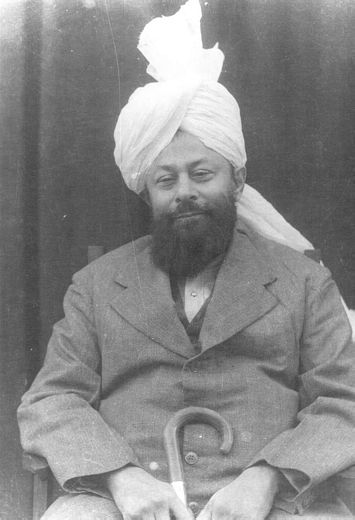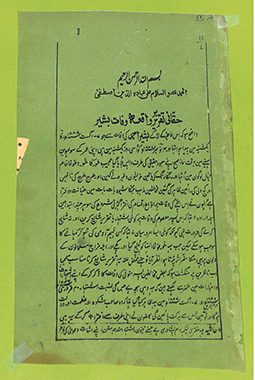
Many people across the world, theists and atheists alike, claim they have prayed long and hard but hear no response. They say that if God was truly listening, He should have answered their prayers and not subjected them to hardship. Unfortunately, these people depict the reality exemplified by the Quranic verse, “Man is made of haste. I will certainly show you My Signs but ask Me not to hasten” (21:38). They pray with the expectation that God will immediately answer their prayers, and, once tired, they give up and instead of blaming themselves, blame God.
On the contrary, the righteous do not become wary or discouraged when praying to God but they remain persistent and continue praying until God accepts their prayer. Though one might expect that prophets, those who are the closest to God, may only need to pray once for God to respond to them – and many times this is indeed the case – they are also the ones who pray the most before He answers their prayers. This practice is common in all prophets, including the Promised Messiah Hazrat Mirza Ghulam Ahmad (peace be upon him) of Qadian.
Whilst debating the Hindus of Qadian and beyond, especially the Arya Samaj, the Promised Messiah (peace be upon him) wished that he be granted a magnificent sign with which he could show the people the manifest truth of Islam, and for this, he endeavored to spend 40 days alone in meditation and prayer. In January of 1886, God revealed to him that he would find what he sought in Hoshiarpur. Hence, towards the end of the month the Promised Messiah (peace be upon him) set out for Hoshiarpur with a few of his companions.
God is All-Powerful – if He willed, He could have spared the precious time of the Promised Messiah (peace be upon him) and could have granted him a manifest sign right then and there. After all, the Promised Messiah (peace be upon him) was a righteous prophet of God, and he was asking Him something which was solely for His sake. However, God guided the Promised Messiah (peace be upon him) to Hoshiarpur so he could pray to Him in solitude for 40 days, following the tradition of many holy men before him.
In Hoshiarpur, the Promised Messiah (peace be upon him) stayed in the upper story of Sheikh Hamid Ali’s (may Allah be pleased with him) Taveila, a quaint two-story building at the edge of town. Here, he instructed his companions that no one should visit him and that they should leave food for him at appointed times and then take the dishes later. On Fridays they would pray Jummah separately at an abandoned mosque at the edge of town. Otherwise, the Promised Messiah (peace be upon him) was alone upstairs with his Lord for 40 continuous days.
People cry after a short while and say that their prayers aren’t accepted – yet how many are willing to pray to God in solitude for 40 whole days?
On February 20th, 1886, the Promised Messiah (peace be upon him) published a leaflet announcing to the world the acceptance of his prayer – a prophecy of the birth of an incredible boy to be gifted with many unique qualities. Finally, now the world would bow down to the truth of Islam, one might assume. However, as is the practice of God the Almighty, He puts His beloved ones in trials to demonstrate their pristine character and firm resolve – therefore, as soon as this prophecy was published, his opponents indulged in their routine abuse and mockery. Immediately people began to spread rumors that the Promised Messiah (peace be upon him) already had a son and was hiding him to conjure a sign in his favor. The Promised Messiah (peace be upon him) refuted this notion in another leaflet published on March 22nd and clarified that this prophecy would be fulfilled within 9 years. Regardless, his opponents did not desist and ridiculed him every chance they could.
In response to the mockery, the Promised Messiah (peace be upon him) published another leaflet on April 8th, 1886 in which he announced that it wasn’t necessary that the prophecy be fulfilled towards the end of the 9 year term but God can fulfill it earlier as well to silence the opponents. Moreover, he announced that the boy will be born very soon and that his wife is currently pregnant – however, the Promised Messiah (peace be upon him) also admitted that he didn’t know for certain whether this child would be the promised one, but he made clear that either this pregnancy or the next one would be a son. On 15th April, 1886, Hazrat Amma Jan (may Allah be pleased with him) gave birth to a girl, which was followed by intense ridicule from all sides. The Promised Messiah (peace be upon him) remained patient, certain that this prophecy would soon be fulfilled. Then finally, on August 7th, 1887, a boy was born to the Promised Messiah (peace be upon him) who was named Bashir Ahmad. He published a leaflet that same day announcing the glad tidings of the fulfillment of the prophecy made on April 8th, 1886. However, when people would ask him if this boy was a fulfillment of the prophecy published on February 20th, he would answer that he had received no confirmation from God the Almighty.
“And We will try you with something of fear and hunger, and loss of wealth and lives, and fruits; but give glad tidings to the patient, Who, when a misfortune overtakes them, say, ‘Surely, to Allah we belong and to Him shall we return’” (2:156-157).
On November 4th, 1888, Bashir Ahmad passed away, and the opposition stirred up a storm of abuse and tried deceiving the public to prove the prophecy false. In response, the Promised Messiah (peace be upon him) published a leaflet on green paper (commonly known as the Green Announcement) explaining that he never claimed that this son was the promised son in fulfillment of the prophecy published on February 20th, 1886, but was the fulfillment of the prophecy published on April 8th, that either the current or next pregnancy would be a boy. He reiterated that the original prophecy remained valid and would most certainly be fulfilled.

Then, a little over a year later on January 12th, 1889, a son was born whom the Promised Messiah (peace be upon him) then named Mahmood Ahmad, who later grew up to be Hazrat Musleh Maud Khalifatul Masih II Mirza Bashiruddin Mahmood Ahmad (may Allah be pleased with him), a magnificent fulfillment of the original prophecy of February 20th, 1886.
From taking a glance at this entire saga from the publication of the initial prophecy until the birth of Hazrat Musleh Maud (may Allah be pleased with him), one sees a clear picture of how the Promised Messiah (peace be upon him) exemplified the Quranic instruction of “and seek help with patience and prayer” (2:46). First of all, the Promised Messiah (peace be upon him) journeyed to Hoshiarpur to spend 40 continuous days praying to God in solitude. From this incredible effort, the Promised Messiah (peace be upon him) was not granted an apparent miraculous sign which would immediately move the masses towards Islam, but was instead granted a (no less miraculous) prophecy which, unfortunately, in the eyes of his opponents, had no value. However, the Promised Messiah (peace be upon him) remained unfazed and gave the Quranic reply, “And wait ye, we too are waiting” (11:123). As is apparent from the repeated leaflets mentioning this prophecy, the Promised Messiah (peace be upon him) was incredibly eager to see its fulfillment to silence his opponents. Hence, one can only speculate as to how much the Promised Messiah (peace be upon him) prayed for God to swiftly fulfill this prophecy. God the Almighty, however, waited to fulfill the prophecy and put the Promised Messiah (peace be upon him) into trial – first with the birth of a daughter (who later passed away after in 1891), and second with the death of his son Bashir. To the untrained eye, both of these events would seem as though God had abandoned the Promised Messiah (peace be upon him) and had not heard his prayers. However, as the Promised Messiah (peace be upon him) would later elaborate in a number of his books, it was necessary for both of these events to happen as they were in fulfillment of other prophecies as well as a means for God to separate the hypocrites from his sincere followers prior to the establishment of the Jama’at. Therefore, God had never rejected the heartfelt prayers of the Promised Messiah (peace be upon him) but instead fulfilled the prophecy in such a manner as would result in true success of his mission and the cause of Islam.
Now, over 130 years since the prophecy of Musleh Maud, we can see as clear as day how God fulfilled the prayers of the Promised Messiah (peace be upon him) and granted him a prophecy which was fulfilled in an incredible manner. Despite the ill health of Hazrat Musleh Maud (may Allah be pleased with him) in his childhood, he bore a long life of 76 years old and became the second khalifa to the Promised Messiah (peace be upon him). He was granted deep insight into both religious and secular matters which was acknowledged by friends and foes alike. During his khilafat, the Jama’at saw incredible progress and its branches began to spread in all corners of the world. Every aspect of the prophecy saw its fulfillment in his person. Even now, over 50 years since his passing, Hazrat Musleh Maud (may Allah be pleased with him) has left a legacy which continues to astonish true believers of the truth of Islam and the Promised Messiah (peace be upon him).
As members of the community of the Promised Messiah (peace be upon him), it should be very clear to us how important it is to remain consistent in our prayers and to not get discouraged. Most certainly God listens to our prayers, as he himself promises in the Quran, “I answer the prayer of the supplicant when he prays to Me” (2:187). Hence, it is on us to fight against our hasty nature and persevere with patience and prayer, just as the Promised Messiah (peace be upon him) set a pristine example before us. Then, we too can also see the fulfillment of our prayers and know with certainty that God was always there, listening to our every plea.



